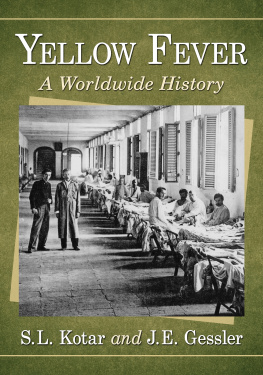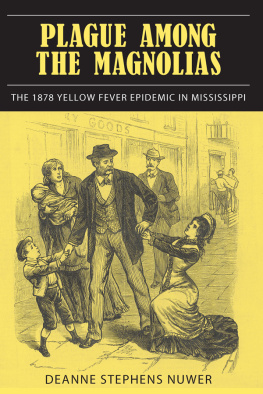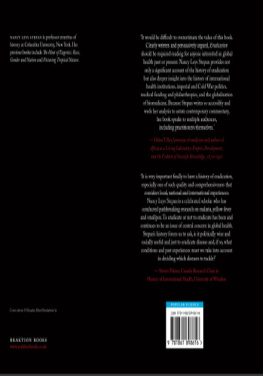Contents
List of Figures
Guide
Pagebreaks of the print version

NECROPOLIS
Disease, Power, and Capitalism in the Cotton Kingdom
KATHRYN OLIVARIUS
The Belknap Press of Harvard University Press
Cambridge, Massachusetts
London, England
2022
Copyright 2022 by Kathryn Olivarius
All rights reserved
Cover design by Marina Drukman
Painting: French Market and Red Store
By Louis Dominique Grandjean Develle, 1840-1850
The Historic New Orleans Collection
ISBN 978-0-674-24105-3 (cloth)
ISBN 978-0-674-27607-9 (EPUB)
ISBN 978-0-674-27608-6 (PDF)
The Library of Congress has cataloged the printed edition as follows:
Names: Olivarius, Kathryn Meyer McAllister, 1989 author.
Title: Necropolis : disease, power, and capitalism in the Cotton Kingdom / Kathryn Olivarius.
Description: Cambridge, Massachusetts : The Belknap Press of Harvard University Press, 2022. | Includes index.
Identifiers: LCCN 2021044327
Subjects: LCSH: Race discriminationLouisianaNew OrleansHistory19th century. | Yellow feverLouisianaNew OrleansHistory19th century. | ImmunitySocial aspectsHistory19th century. | SlavesLouisianaNew OrleansHistory19th century. | Social stratificationLouisianaNew OrleansHistory19th century. | New Orleans (La.)Race relationsHistory19th century.
Classification: LCC E185.93.L6 O45 2022 | DDC 305.8009763 / 3dc23 / eng / 20211018
LC record available at https://lccn.loc.gov/2021044327
To my family and especially to Joe
Contents
I started writing Necropolis almost a decade before Covid-19 arrived in the United States in 2020. If there are aspects to this story that feel contemporary, it is because they are. Two centuries ago, humans took advantage of epidemics in ways that caused misery, enriched the few, and increased inequality. Today, we have sadly seen many similar patterns unfold. I wish this story and its themes felt more like anachronism.
If the outcome of a persons experience with yellow fever is known, I note it in the text. For example, Benjamin Henry Latrobe (d. YF 1820) means Latrobe died from yellow fever in 1820; J. D. B. De Bow (a. YF 1847) means De Bow fell sick with yellow fever in 1847 but survived and became acclimated.
One January morning in 1825, a white, seventeen-year-old boy from Newton, New Jersey, woke up with a case of Mississippi feveran insatiable urge to head west and south.
The stranger could not pinpoint precisely when things began to change. He noticed the first pang of unease in late June, when every dwelling seemed to have a chambre garnie or to let placard in the window. He noticed it again on July 1, when all the citys normally deafening church bells went quiet in unison. It was disquieting that everyone in his congregation renewed their baptismal vows and embraced at the end of the service as if for the last time. Smaller things bothered him, too: his neighbors preoccupation with estates and wills; the sudden profusion of black armbands; ragged children begging door-to-door; coffin-toting slaves. One morning, three of his fellow lodgers decided to leave town. They asked the stranger to safeguard their possessions, promising they would be back soon. They clasped his hand and hurried off to the docks, fighting their way through the scrum onto the first departing boat. That night the remaining tenants made fun of the truants for their cowardice. The stranger agreed that their departure seemed hasty, even an overreaction. But he quietly wondered what they knew that he did not. And by late July it was like a candle had been extinguished: New Orleans, the great emporium of western commerce, had become a ghost town.
Suddenly the strangers whole life was eclipsed by yellow fever, a demon king that descended upon the city every second or third summer and sparked terror across the tropical Atlantic. At Masperos, the coffee shop, businessmen discussed the latest death tolls.
The stranger lay awake at night listening to distant cannon fire, rockets discharged by the city guard to dispel the disease-causing miasmas emanating from the nearby swamps. Every hour or so, he leaped out of bed and peered into the mirror, searching for any sign of yellowing skin or bloodshot eyes. Nothing, yet. He sprinkled some chlorate of lime on the floor before returning to bed, pulling the mosquito netting tight around his mattress. In the morning he scurried to work through deserted streets. Most of the stores he passed were empty or staffed by just a clerk or two, the factors and merchants having traveled north or to their country plantations for the season. At the office he picked up a newspaperquite thin these daysbut put it down before reaching the obituaries. He tried to do some work but was distracted. He took up pen and paper to write a letter home but found he had no energy, having worked his spirits down to zero. All he could manage were a few limp lines to a friend up north: I am well and Harty [sic] as I ever was in my life.
The stranger mentioned to his boss, a New Yorker with ten years tenure in Louisiana, that he was considering leaving town, just for a few weeks. Or maybe he would ride out to Lake Pontchartrain for the day? Some fresh air would be good, he said. A chance to clear his head. His boss was sympathetic, recalling his own brush with yellow fever back in 1817, the last big one. He told the stranger to follow his conscience; he should go if he needed to. But he also reminded the stranger that his job was not guaranteed. It was nothing personal. But there were plenty of fully acclimated, brave, bilingual men who would gladly fill his shoes. The stranger, feeling both disposable and defiant, decided to stay put.
A few days into August, the stranger felt anxious and hot around the collar. He told his co-clerk that he just needed a minute to lie down, that the spell would pass. But soon he was gripped by an intense headache, muscle pain, nausea, and chills. He could not see straight, so he lay down on the floor. It was like a civil war was raging in his stomach. Was this it? Should he have left town? Had keeping his job been worth risking his life? With his skull now feeling as if filled with molten lead, the stranger conceded it was too late for regrets. And anyway, this was a disease that other sorts of people died of. He was young and healthy. He was determined to survive and become an acclimated citizen.
The concerned coworker carried the ailing stranger back to his boardinghouse and called for a doctor, rooting around in the strangers belongings for the pouch of money he had squirreled away with $50 (about a months wages) inside for just such a medical emergency. By the afternoon, the patient was delirious and boiling hot. A Black nurse was called forat $3 a dayto deliver blankets one moment, ice the next. Then the doctor arrived and, after receiving his initial payment of $10, found the patient restlesstalkativeill-natured. The innkeeper relented, pocketing a $3 bribe on her way out.
It was evening now and the stranger was not improving. The doctor directed the nurse to restrain the patient as he applied mustard powder to his abdomen, blistered his hands and feet with a red-hot iron, and poured ice water over his head. Next the stranger was force-fed purgatives. His fever was so high at this point104Fthat the doctor decided to bleed him. One pint, then two, then three. The stranger lost consciousness. When he revived, the doctor bled him again. The nurse protested. This approach was reckless, she insisted. The doctor loudly chastised her, making sure those loitering outside the door heard him. But he quietly changed course, opting now for leeches. Before leaving for the night, the doctor instructed the nurse to swaddle the stranger in thick woolen blankets. Around midnight the boy was suddenly agitated and wide awake. He struggled to push off his heavy covers, to get up from his sweat-soaked mattress and run into the street. This spurt of energy was taken as a promising sign by his coworker. Perhaps he had turned a corner? No, replied the nurse, who had noticed the strangers yellowing eyes and skin. This was jaundice, a sign of organ failure.








